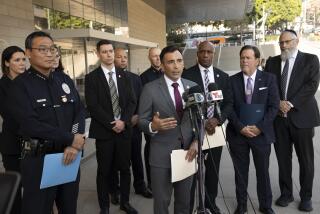When We Bleed From Hatred’s Wounds
- Share via
Loc Minh Truong’s head was bashed so viciously that for more than a day, police could only venture a guess as to his race. Asian or Latino, they figured, because of his black hair.
Allen Schindler’s mother says she could identify her son’s body only by the tattoos on his forearms. His face was pulp.
When he was killed last fall in Japan, Schindler was a U.S. Navy seaman about to be discharged for being gay. When he was nearly killed two weeks ago, Truong was on the beach in Laguna near the city’s gay bars.
When both men were discovered, the signs of their humanity had been reduced to flesh and blood and bone. The humanity of their attackers is in doubt.
This is gay bashing, one of those catch-all phrases.
I’ve tended to think of it in political terms: this homophobe or that roiling the fears of the citizenry by trotting out lies and distortions as proof of some terrible wrong. Here in Orange County, there are many practitioners of the craft.
This is the stuff of anti-gay referendums and initiatives, like the one that won in Colorado and the one that might have won in Oregon. And this is the stuff that creates a mood, a feeling about how far an envelope can be pushed.
Permissiveness, we might call it, tolerance that stretches the wrong way. Just how much will society cover with a wink? A joke, a smear, discrimination, being bashed to death?
Police believe they have caught the young men who nearly killed Loc Minh Truong, who is 55. One is an 18-year-old high school senior, another is 16 and another is 22. It had been a night out with friends.
The Laguna Beach police chief quotes one of these friends as saying the group set out to “beat up some fags.” Among the charges prosecutors have filed against them now are attempted murder, assault and the commission of a hate crime.
Allen Schindler was 22 when he was killed. A 20-year-old Navy airman faces charges in Schindler’s death. A second sailor, also 20, was convicted on three counts, but prosecutors agreed to a deal: four months in prison in exchange for testifying against his friend.
The Navy kept all this quiet for as long as it could, but gay-rights activists brought it to light rather noisily with pickets at the Pentagon. They want the incoming Administration to investigate, they want something done.
Schindler’s lover in San Diego, a Navy veteran, wrote to Bill Clinton. “It is absolutely senseless for someone to die because of who he is,” he said.
But it happens more often than people think.
The National Gay and Lesbian Task Force says that in the five cities it surveys--San Francisco, New York, Boston, Chicago and Minneapolis-St. Paul--the number of people murdered simply because they were believed to be gay rose from two in 1990 to five in 1991.
The trend for 1992? More murders, more assaults, more viciousness all around.
Although the figures for last year haven’t yet been compiled, the director of the task force’s anti-violence project says murders will number at least eight, maybe reaching into the teens.
And these are murders , in only five cities. A Loc Minh Truong, for example, wouldn’t make the list.
Neither will Allen Schindler, murdered in a public restroom in Sasebo, Japan, nor Oregon roommates Mae Cohens and Brian Mock. She was a lesbian and he was gay.
They burned to death last fall in Salem when their house was firebombed during the campaign for passage of Measure 9. Political discourse, not gay bashing, many called the campaign back then.
The same groups behind the Colorado and Oregon measures are now hoping to put similar ones on the ballots of 11 other states, including California.
The losing Oregon ballot initiative required all state institutions to present homosexuality as “abnormal, wrong, unnatural and perverse,” and to actively discourage its practice.
Murder is one way to discourage its practice.
Allen Schindler’s mother says she doesn’t know if her son was homosexual. “But even if he was, is that justification for someone to kill him?” she asks.
Loc Minh Truong’s nephew says he doesn’t think that his uncle is gay, “but even if he is, no one in his right mind could do to him what those kids did.”
So we are back to permissiveness again, back to the vague signals that are supposed to let people know when they are carrying a “joke” or a “lesson” too far. Change a few words here and there, and minorities and women can really understand these jokes and lessons, too.
Truong’s niece says this: “The man who did this (to my uncle) made a mistake. I hope he doesn’t experience what prejudice is.”
Such hatred strikes many blows--even if, this time, not all of us bleed from the wounds.
More to Read
Sign up for Essential California
The most important California stories and recommendations in your inbox every morning.
You may occasionally receive promotional content from the Los Angeles Times.













